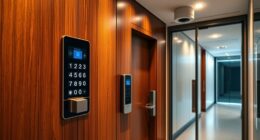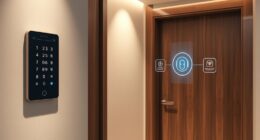Ensuring the safety of your family is crucial and home security systems play a vital role in preventing crime and keeping your loved ones safe. By installing visible security features such as cameras and alarms, you can potentially deter up to 83% of burglars from attempting a break-in. These systems also provide peace of mind by offering remote monitoring and instant alerts for emergencies like fires or carbon monoxide leaks. Not only does investing in a security system protect your home, but it may also reduce your insurance premiums. There are numerous benefits to enhancing your home’s security and customized options are available to meet your specific needs.
Key Takeaways
- Security systems protect your family and belongings from burglary, fire, and environmental disasters, enhancing overall safety.
- Visible security measures deter 83% of burglars, significantly lowering the risk of break-ins.
- Remote monitoring provides peace of mind, allowing you to oversee your property from anywhere.
- Insurance companies often offer discounts for homes with security systems, saving homeowners an average of $200 annually.
Importance of Home Security
Home security is essential for protecting your family and belongings from threats like burglary, fire, and environmental disasters. Installing a home security system offers you thorough security that can greatly reduce the risk of these dangers.
Security systems help you protect against various threats by using technology that detects smoke, fire, carbon monoxide, and water damage. Additionally, modern security systems often integrate features like garage door openers to enhance home security and provide convenient access control. With these features, you can enhance overall household safety.
One effective way to deter potential burglars is through visible security measures. Studies show that approximately 83% of burglars consider security features before attempting a break-in. This means that simply having a security system in place can be a powerful deterrent.
Additionally, modern systems provide remote monitoring capabilities, allowing you to keep an eye on your home from anywhere. This flexibility gives you peace of mind, knowing you can check on your property even when you're away.
Professional monitoring services also guarantee timely responses from emergency services, further increasing the effectiveness of your home security system. By investing in these measures, you're taking a proactive step in safeguarding your home and loved ones.
Key Benefits of Security Systems

When you invest in a security system, you're not just protecting your home from burglary; you're also gaining peace of mind with remote monitoring options.
Additionally, incorporating advanced technology such as AI security can enhance your system's capabilities by providing robust defenses against potential cyber threats, acting as a silent guardian of sensitive information.
Plus, many insurance companies offer discounts for homes with security systems, making it a smart financial choice.
Let's explore these key benefits in more detail.
Protection Against Burglary
Investing in a security system greatly reduces the likelihood of burglary, making your property a less attractive target for intruders.
Statistics show that homes with visible security systems deter 83% of burglars, highlighting their effectiveness in providing protection.
Additionally, just like how a Mid-Century Modern Design can enhance your home's aesthetic, a well-implemented security system can greatly elevate your peace of mind.
By taking proactive measures like installing monitored security, you not only enhance your home security but also greatly reduce burglary rates in your neighborhood.
When a break-in occurs, monitored security systems can alert emergency services immediately, ensuring a quicker response time.
This rapid action can make all the difference, potentially preventing property loss and damage.
The financial benefit of avoiding burglary is substantial; with the average cost of a burglary around $2,661, investing in a security system could save you from unexpected expenses.
Remote Monitoring Convenience
Remote monitoring transforms your approach to home security, allowing you to oversee your property effortlessly from anywhere in the world. With a smart home security system, you can access live feeds from your security cameras, ensuring you're always in the loop.
This capability reflects the growing importance of cybersecurity measures, particularly as homes become more interconnected with technology. Remote access means you'll receive real-time alerts for any unusual activity, so you can respond immediately if something seems off.
This convenience is especially beneficial for homeowners with children, as you can easily monitor their safety while you're away. Plus, you can manage access points like electronic door locks, giving you control over who enters your home.
Additionally, security systems offer the ability to monitor environmental conditions, such as smoke or carbon monoxide levels. With alerts sent directly to your phone, you'll have peace of mind knowing you can act quickly in emergencies.
Another advantage is simulating occupancy by remotely controlling lights and appliances. This can help deter potential intruders and enhance security while you're not home.
Lower Insurance Premiums
Lowering your insurance premiums is one of the most appealing benefits of installing a home security system. When you have a security system installed, insurance companies often recognize the reduced risk of theft and damage, which can lead to significant savings on your homeowners insurance.
For example, recent posts on security trends emphasize the importance of extensive systems in minimizing risks. On average, you could save around $200 a year just by investing in a thorough security system.
Consider these advantages of monitored security systems:
- Up to 20% Reduction: Many insurance providers offer discounts of up to 20% on premiums.
- Advanced Security Features: Systems that include smoke detectors and carbon monoxide alarms might provide additional savings.
Types of Home Security Systems

Home security systems come in various types, each designed to meet different needs and preferences for safeguarding your home. A basic home security system typically includes a central hub, motion sensors, contact sensors for doors and windows, and an alarm siren.
You can choose between wired and wireless home security systems; the latter offers the convenience of remote monitoring through internet connectivity. If you're hands-on, DIY Home Security Systems allow you to customize your setup. Additionally, incorporating features like ozone air purifiers can help improve indoor air quality, creating a healthier living environment alongside your security measures.
When considering monitoring options, think about professional vs. self-monitoring. Professionally monitored systems provide constant oversight and automatic alerts to emergency services, while self-monitoring puts you in control of alerts and responses.
For those looking to enhance convenience, smart home integration enables you to manage security alongside other smart devices, like lighting and thermostats.
Video surveillance is another vital component. Various cameras, including indoor, outdoor, and infrared night vision cameras, can help you monitor your property effectively. By integrating motion sensors and cameras, you can create a thorough security solution tailored to your specific needs, ensuring your home remains safe and secure.
Cost of Home Security Systems

When considering a home security system, you'll want to factor in both installation and equipment costs, which average around $400.
The investment in a security system can also help protect against potential losses associated with increasing rates of personal debt and financial risks, as evidenced by trends in consumer protection understanding risks associated with internet casinos.
Additionally, monthly monitoring expenses can range from $9 to $60, depending on the services you choose.
It's important to weigh these costs against the potential savings on insurance premiums and the financial loss you could face from a burglary.
Installation and Equipment Costs
Investing in a home security system involves various upfront equipment and installation costs that can greatly impact your budget. The average upfront equipment cost for a high-quality security system is around $400, which usually includes cameras, control panels, and sensors.
Professional installation can add to your expenses, especially if your system is complex. Reflecting on factors like key factors in choosing a home cleaning service can be useful in understanding what to look for in a security system.
Here are some factors to keep in mind:
- Installation costs can vary greatly based on the system's complexity.
- Many security systems offer flexible contract lengths, from month-to-month to multi-year commitments, allowing homeowners to choose what fits their budget.
Ultimately, understanding these costs will help you make an informed decision on the best security solution for your home.
Monthly Monitoring Expenses
Many homeowners find that monthly monitoring expenses for security systems can vary widely, typically ranging from $9 to $60 based on the services and features offered.
Basic plans often cover essential monitoring services like burglary alerts, while premium packages may include added benefits such as smoke and water detection. Choosing professional monitoring can greatly enhance emergency response times, ensuring you get quicker assistance when it matters most.
If you're looking to save on costs, some systems offer self-monitoring options, which eliminate monthly fees but may require you to take more responsibility in emergencies. While this can be an effective way to lower expenses, it mightn't provide the same peace of mind as professional monitoring.
It's also worth noting that investing in a monitored security system can lead to homeowners insurance discounts, typically ranging from 5% to 20%. These discounts can help offset your monthly monitoring fees, making home security more affordable.
Ultimately, weighing the various monitoring services available will help you decide what fits your needs and budget best.
Advanced Features and Functionality

Modern home security systems offer advanced features that enhance your ability to monitor and control your property, integrating seamlessly with your smartphone for real-time updates and remote access.
With these smart security systems, you can enjoy peace of mind knowing that your home is protected with cutting-edge technology.
Here are some key features to examine:
- Real-time alerts: Receive instant notifications about any unusual activity, ensuring you're always in the loop.
- Video recording capabilities: Capture and store footage of events around your property, providing essential evidence if needed.
These systems also integrate with smart home technology, enabling you to manage lighting and temperature alongside security features for ideal home automation.
Remote monitoring allows you to keep an eye on your property from anywhere, while a centralized base station enhances the functionality of all connected sensors.
Security System Placement Strategies

Effective security system placement is essential for ensuring thorough protection against potential intruders. You should focus on covering all entry and exit points, such as doors, windows, and garages, to minimize vulnerabilities. Motion sensors need to be installed in high-risk areas, like pathways to entrances and large windows. Security cameras should be positioned at key locations, including the front door and backyard, to deter suspicious activity.
| Security Component | Recommended Placement | Purpose |
|---|---|---|
| Security Cameras | Front door, backyard | Capture activity, deter intruders |
| Motion Sensors | Pathways, large windows | Detect movement in vulnerable areas |
| Entry/Exit Points | All doors and accessible windows | Monitor all access points |
| Home Safe Location | Hidden, secure area | Protect valuables from theft |
Consulting with security experts can help you identify ideal sensor placement based on your property's unique layout and potential weaknesses. Regularly assess these placements to adapt to any changes in your home environment. A well-placed security system not only enhances safety but may also lower your home insurance premiums.
Enhancing Home Security Effectively

Installing a well-designed security system is just the beginning; enhancing home security effectively requires ongoing attention to features and technologies that work together to keep you and your property safe.
Here are some essential strategies to take into account:
- Integrate smart technology: Control your home security systems remotely, allowing you to receive real-time alerts and monitor your property from anywhere.
- Opt for professional monitoring: This guarantees that emergency responders are notified promptly in case of smoke, fire, or intrusion, greatly improving response times.
Frequently Asked Questions
What Are the Benefits of a Home Alarm System?
A home alarm system offers peace of mind, deters burglars, and reduces insurance premiums. With rapid emergency response and alerts for smoke or gas leaks, you're ensuring safety and security for your family and property.
Does a Security System Add Value to a Home?
Yes, a security system adds value to your home. It attracts potential buyers, enhances marketability, and can lead to quicker sales and higher offers, giving you a competitive edge, especially in areas with higher crime rates.
Is It Worth Having a Home Alarm?
Yes, having a home alarm is worth it. It not only deters crime but also enhances your safety, potentially lowers insurance costs, and provides peace of mind knowing you're protected against various threats.
What Are the Disadvantages of Home Security System?
Imagine your castle's drawbridge malfunctioning. Home security systems can falter too, leading to false alarms, high costs, and complex interfaces. If you're not vigilant, they might become more trouble than protection for your peace of mind.
How Much Electricity Does a Home Security System Consume?
The home security systems electricity consumption varies depending on the type and number of devices. On average, a basic system with a few cameras and sensors consumes around 25-50 watts per hour. However, more advanced systems with additional features may consume up to 300 watts per hour.
Conclusion
In today's world, investing in a home security system isn't just smart; it's vital.
Did you know that homes without security systems are 300% more likely to be burglarized?
By taking proactive measures to protect your home, you not only safeguard your belongings but also guarantee peace of mind for you and your loved ones.
With various options and advanced features available, finding the right security solution for your needs has never been easier.
Don't wait—secure your home today!









